Children’s Subjective Well-being in Bangladesh: Influence of Socio-demographic and Economic Factors
Overall, research on children’s subjective well-being has received considerable attention from researchers and policymakers in past decades. However, we know very little about children’s subjective well-being in Bangladesh, which has around 64 million children. This article attempts to fill part of this gap. It aims to identify the key socio-demographic and economic factors that are associated with children’s subjective well-being, using data from the Children’s Worlds 3rd Wave survey, which was conducted for the first time in Bangladesh in 2018. Over 3,000 children took part in the survey from three geographical regions in the country. Eight key socio-demographic factors were examined, and four – gender, family structure, rural-urban locality and geographic region – were found to be significantly linked with different levels of children’s subjective well-being in Bangladesh. Three economic factors – material deprivation, family finance worries, and affordability to buy enough food – were significantly associated with subjective well-being assessments in Bangladesh. Out of these seven significant factors, rural-urban locality had the highest effect on subjective well-being among children followed jointly by material deprivation, affordability to buy enough food, and geographical regions. These findings are discussed in the context of previous empirical studies and theories on subjective well-being with special emphasis on their theoretical, methodological and policy significance, not only for Bangladesh but also for cross-cultural research context.
Population Review
Volume 60, Number 1, 2021
Type: Article, pp. 119-140
Children’s Subjective Well-being in Bangladesh: Influence of
Socio-demographic and Economic Factors
Author: Haridhan Goswami
Affiliation: Department of Sociology, Manchester Metropolitan University, United Kingdom
Corresponding author/address: Haridhan Goswami, Department of Sociology, Manchester Metropolitan University, United Kingdom; email: H.Goswami@mmu.ac.uk
Abstract
Overall, research on children’s subjective well-being has received considerable attention from researchers and policymakers in past decades. However, we know very little about children’s subjective well-being in Bangladesh, which has around 64 million children. This article attempts to fill part of this gap. It aims to identify the key socio-demographic and economic factors that are associated with children’s subjective well-being, using data from the Children’s Worlds 3rd Wave survey, which was conducted for the first time in Bangladesh in 2018. Over 3,000 children took part in the survey from three geographical regions in the country. Eight key socio-demographic factors were examined, and four – gender, family structure, rural-urban locality and geographic region – were found to be significantly linked with different levels of children’s subjective well-being in Bangladesh. Three economic factors – material deprivation, family finance worries, and affordability to buy enough food – were significantly associated with subjective well-being assessments in Bangladesh. Out of these seven significant factors, rural-urban locality had the highest effect on subjective well-being among children followed jointly by material deprivation, affordability to buy enough food, and geographical regions. These findings are discussed in the context of previous empirical studies and theories on subjective well-being with special emphasis on their theoretical, methodological and policy significance, not only for Bangladesh but also for cross-cultural research context.
Keywords
Children, subjective well-being, policies, Bangladesh, material deprivation, gender, rural-urban disparity
© 2021 Sociological Demography Press
MLA
Goswami, Haridhan. “Children’s Subjective Well-being in Bangladesh: Influence of Socio-demographic and Economic Factors.” Population Review, vol. 60 no. 1, 2021. Project MUSE muse.jhu.edu/article/792010.
APA
Goswami, H. (2021). Children’s Subjective Well-being in Bangladesh: Influence of Socio-demographic and Economic Factors. Population Review 60(1), https://www.muse.jhu.edu/article/792010.
Chicago
Goswami, Haridhan. “Children’s Subjective Well-being in Bangladesh: Influence of Socio-demographic and Economic Factors.” Population Review 60, no. 1 (2021) muse.jhu.edu/article/792010.
Endnote
TY – JOUR T1 – Children’s Subjective Well-being in Bangladesh: Influence of Socio-demographic and Economic Factors A1 – Goswami, Haridhan JF – Population Review VL – 60 IS – 1 PY – 2021 PB – Sociological Demography Press SN – 1549-0955 UR – https://muse.jhu.edu/article/792010 N1 – Volume 60, Number 1, 2021 ER –
Always review your references for accuracy and make any necessary corrections before using. Pay special attention to personal names, capitalization, and dates. Consult your library for more information on citing sources.




